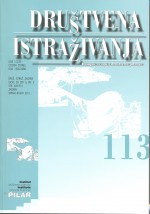Neki aspekti brige odraslih za mlađe generacije: spolne i dobne razlike
Some Aspects of Adults' Concern for the Younger Generations: Sex and Age Differences
Author(s): Ivana Tucak JunakovićSubject(s): Social Sciences
Published by: Institut društvenih znanosti Ivo Pilar
Keywords: generativity; McAdams and de St. Aubin's model; adulthood
Summary/Abstract: Erikson's concept of generativity refers to the concern for younger generations and for one's lasting contributions to society, which is the main issue of middle adulthood. After Erikson, the construct of generativity was elaborated by many authors, and its widest elaboration is presented in McAdams and de St. Aubin's model of generativity (1992). In previous testing of the model, the relations among a few of its components were tested. Therefore, the study was conducted with the aim to test the relations among five, out of seven, components of the model (generative desire, concern, commitment, belief in the species, and generative action), and to explore sex and age differences in those components. A sample of 300 adults 25 to 75 years old participated in the study. Components of generativity were measured by the previously developed scales, their adapted and culturally adjusted versions, or by the newly constructed scales. In line with the assumptions, the analyses showed that almost all of the generativity components correlated significantly and positively. The results also suggest that generativity is a developmental issue not only of the middle, but of the entire period of adulthood. Furthermore, sex differences in the majority of the components of generativity were not significant. Only communion orientation (as an aspect of generative desire), and generative action were more pronounced in women. The study results were interpreted in line with the theoretical approaches to generativity, primarily with those proposed by Erikson and McAdams and de St. Aubin, as well as in the context of theories of development in adulthood.
Journal: Društvena istraživanja - Časopis za opća društvena pitanja
- Issue Year: 20/2011
- Issue No: 113
- Page Range: 671-692
- Page Count: 22
- Language: Croatian

